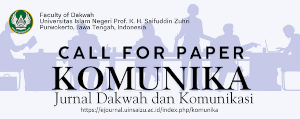PARADIGMA BARU MENGEMAS DAKWAH MELALUI MEDIA TELEVISI DI ERA GLOBALISASI
DOI:
https://doi.org/10.24090/komunika.v3i2.121Keywords:
globalization, television, marketable, talk show, interactive.Abstract
In this global era, da’wah through television has an important role in human development, especially akhlaq,moral, and character development. At present, television should deliver da’wah programs with a new paradigm adopting 5basic elements: 1) as the centre of information for all social classes; 2) as a media of education and instruction, whichparticipate in socializing religious values so that it can promote the birth of intellectual and religious Muslim society (khoiruummah); 3) da’wah package with direct or indirect interactive methods with da’i or da’iyah can give a fast and appropriatesolution to the society; 4) the existence of actual and creative da’wah programs on TV can balance the uneducativeprograms, especially foreign cultures which come into society without any boundaries; 5) television can be a means ofeconomic and social development among Muslims through producing marketable da’wah programs, such as talk show,religious drama program (sinetron), Islamic movies, etc. and this can be the source of financial funding for Islamic preaching.Downloads
Download data is not yet available.
Downloads
Issue
Section
Articles
License
Authors who publish with this journal agree to the following terms:
- Authors retain copyright and grant the journal right of first publication with the work simultaneously licensed under a Creative Commons Attribution-ShareAlike 4.0 International License that allows others to share the work with an acknowledgement of the work's authorship and initial publication in this journal.
- Authors are able to enter into separate, additional contractual arrangements for the non-exclusive distribution of the journal's published version of the work (e.g., post it to an institutional repository or publish it in a book), with an acknowledgement of its initial publication in this journal.
- Authors are permitted and encouraged to post their work online (e.g., in institutional repositories or on their website) prior to and during the submission process, as it can lead to productive exchanges, as well as earlier and greater citation of published work (See The Effect of Open Access).

























